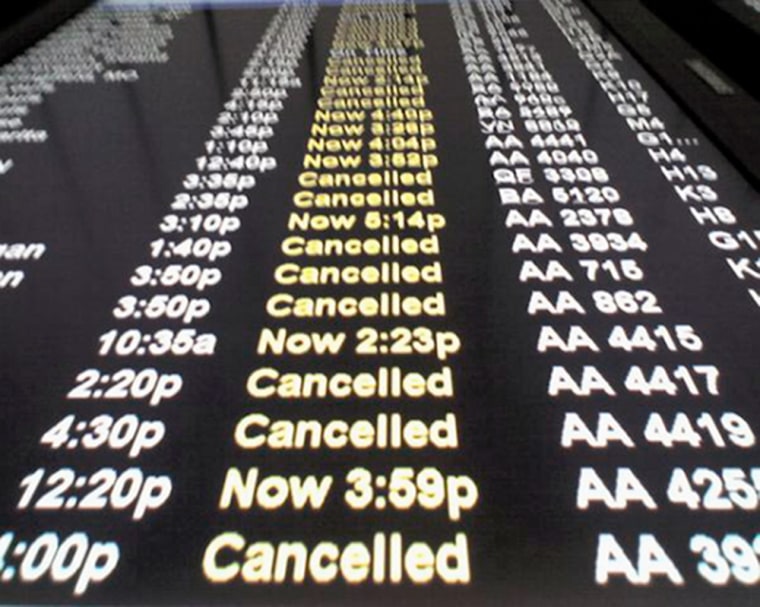Imagine your bags are packed for the getaway of your dreams. You rearranged your schedule, canceled meetings and lost hours of sleep planning every detail of it. You arrive at the airport two hours early, proceed through security, almost unable to contain your vacation excitement. Then disaster strikes, in flashing letters on the arrival/departure screens: FLIGHT DELAYED. Or, even worse: FLIGHT CANCELED.
Inclement weather can affect air travel in any season, even on the clearest of days. Whether it's high winds, rain, sleet or snow, each year brings a slew of delays that could severely cramp your travel plans. With some simple planning you can alleviate the frustration of last-minute itinerary changes and flight delays or cancellations so that a bad start (and bad weather) doesn't ruin your trip.
Get forecasts as soon as possible
Before you leave for travel of any kind, it's always a good idea to check the forecasts for your departure and destination city. For complete weather information and forecasts for just about any destination on earth, visit the Weather Channel. You can find weather maps, storm watch information and even a complete travel-specific weather section. Seasonal travel information, like foliage and ski reports, can also be found on this site. Enter a zip code, city or region to get the current forecasts, and even get 10-day local forecasts for over 70,000 destinations worldwide.
For climate information on a particular region, a good place to look is WorldClimate.com.
Bad weather there affects flight status here
Bad weather almost anywhere can wreak havoc with an airline's route schedule, as crews and planes that are stranded at one airport never arrive at subsequent airports, and a ripple effect occurs. When you learn of weather delays in important hub cities, it's time to call your airline to inquire of potential delays on your flight.
Reroute your connections
Sometimes the weather at your departure city and your destination can be fantastic, but your connecting city is a mess. Call ahead to see if you can reroute your connection flight through airports with no delays.
Say you're in California heading to Florida and your itinerary has a connection in Dallas, the site of heavy weather. Call your airline from California and ask to be rerouted through a different part of the country — Chicago, for instance. Your itinerary might get complicated, but at least you won't be sleeping in an airport!
Book morning flights
Morning flights are less likely to be delayed or canceled than evening flights. The logistical effects of heavy weather accumulate as the day goes on and more and more flights are delayed or canceled. Planes are more likely never to arrive, or to be put into the back of long lines for takeoff or landing as the day progresses.
Act fast on hotel reservation changes
If you anticipate an unplanned layover, get to a telephone as quickly as possible to make hotel reservations. Even better — if you anticipate a layover in a connecting city further along on your itinerary, make a reservation immediately. If you wait until an entire airport's worth of stranded travelers are also scrambling to make reservations, chances are good that airport hotels will be sold out.
Call your airline early and often
Airlines typically update flight status information on a "just in time" basis; that is, they don't change official status until it's absolutely certain that there will be a delay. So just because they told you your plane is on time at 2 p.m. doesn't mean it will be 30 minutes later.
Scan departure screens
If you anticipate a delay, check departure screens for your flight. If there is a delay, look for an airline representative and ask for instructions before you head to check in. If there is a delay, it's time to call the airline.
Use your airline's 800 number
It is often much faster, more convenient and more successful to use an airline's 800 number to make alternate arrangements than it is to stand in line. Not so long ago, this almost guaranteed you some satisfaction — for better or worse, most travelers have figured this one out and the stampede to the phones (or the sound of cell phones being whipped out) often accompanies every flight status announcement.
For those with remote Internet access, check FlightStats.com for up-to-the-minute weather and air delay information at major airports across the U.S. Also, most airlines now do real-time flight status updates on the Web. See Contacting Your Airline for numbers and direct links.
Don't stray too far from the gate
If you're already at the airport, gate agents may make important announcements not only concerning flight status, but of alternate flight options, lodging offers and more. Make sure you or someone in your traveling party stays near your gate to hear any important announcements.
Know your travel insurance
If you are considering purchasing travel insurance, understand that many travel insurance policies do not cover acts of God such as weather disasters. Check carefully with your provider before you buy.
